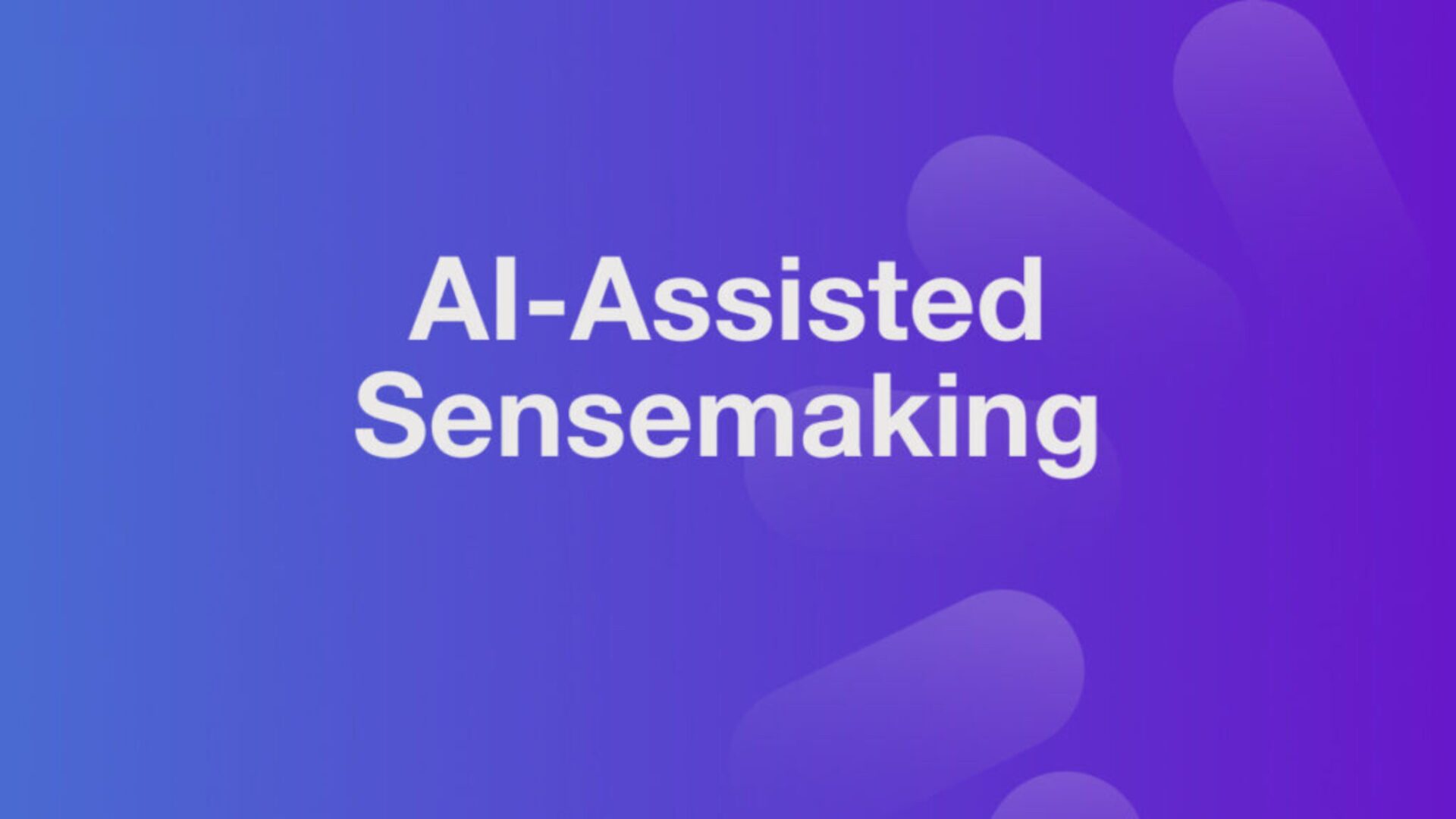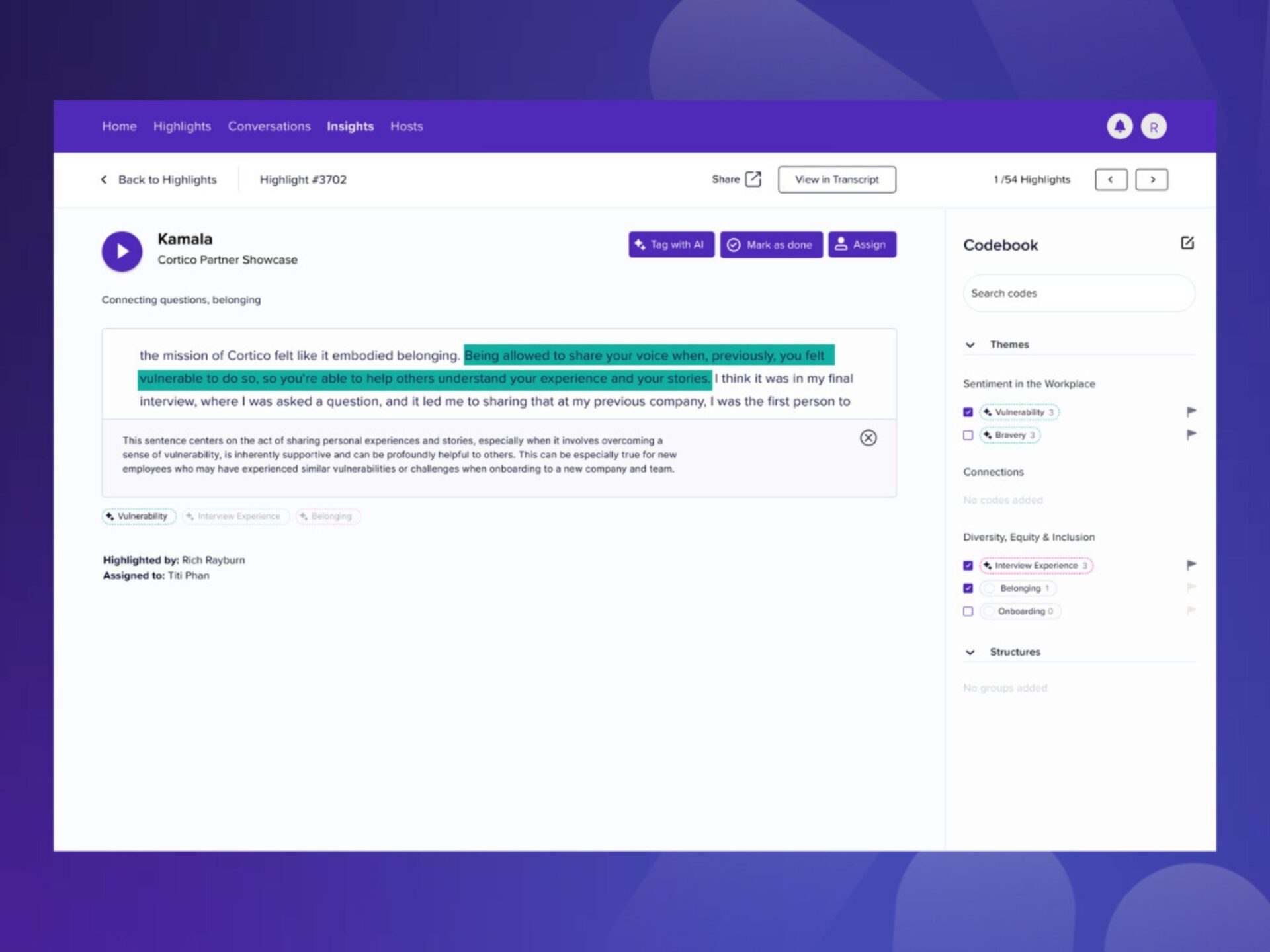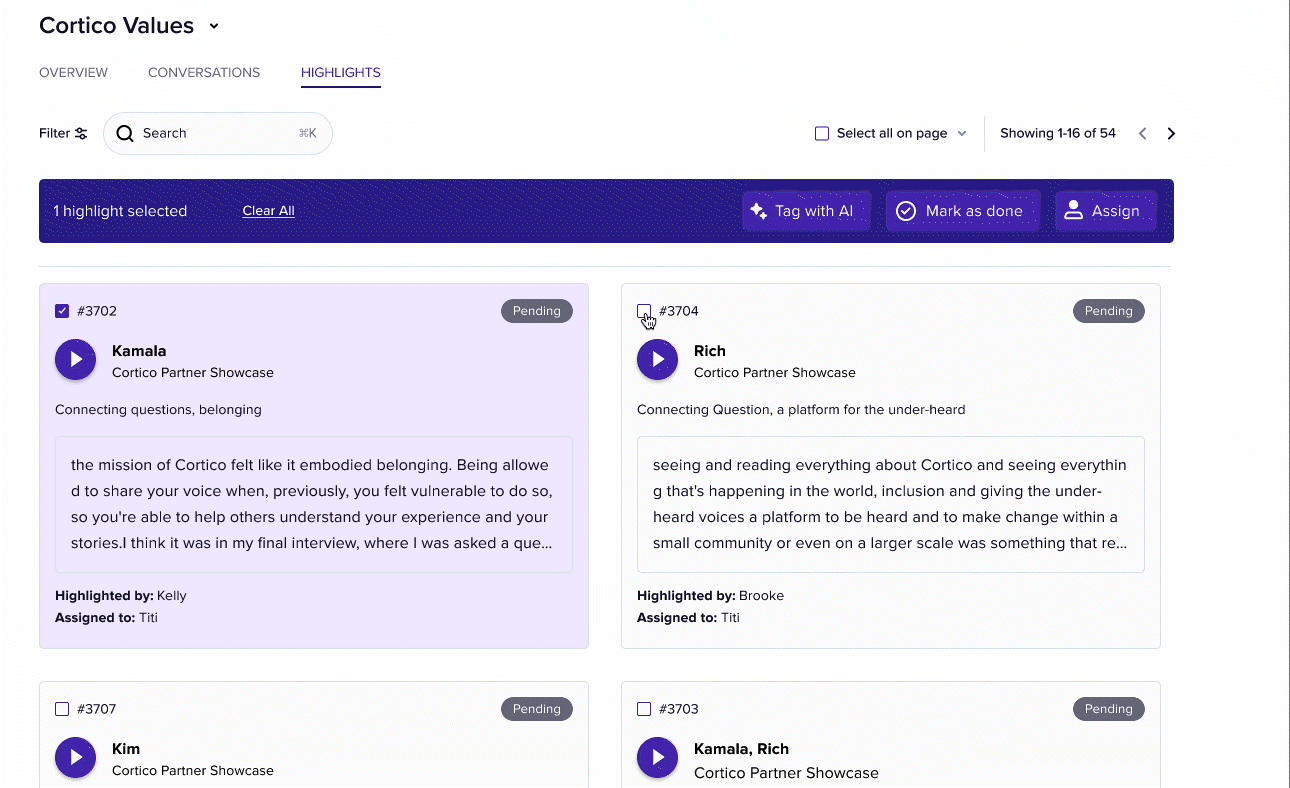
The Next Chapter in Cortico’s Mission to Amplify Underheard Voices
In the landscape of today’s civic spaces, where the loudest voices tend to dominate and discussions quickly devolve into virtual (or literal!) shouting matches, Cortico’s mission feels more important than ever: to elevate the perspectives of the underheard and provide a platform for constructive communication at scale. With the addition of several new AI-assisted sensemaking features to our platform, we’re not just advancing it’s technical capabilities, we’re making major strides towards our vision of a more accessible, inclusive, and dynamic approach to civic engagement.
Enhancing Sensemaking with AI Support
Sensemaking is our human-led, down-to-earth version of qualitative analysis that leverages technology to derive meaning from recorded conversations. It puts analysis in the hands of communities to collect, share, and elevate their own local knowledge. Despite the effectiveness of our current sensemaking process, the time and resources required are a roadblock for some partners. By weaving optional, efficiency-boosting AI supports into the sensemaking workflow, we aim to remove these roadblocks, enabling wider adoption of our proven framework for nuanced conversation analysis that can inform decision-making.

Usability and Community Power
In addition to incorporating tools like AI-assisted thematic tagging and AI-generated codebooks, we’re making a number of usability improvements to Insights, the sensemaking module of our platform. Our goal is not just to make sensemaking faster, but also to make qualitative analysis techniques easily learnable by anyone without extensive training. Partners will now not only be elevating underheard voices through small group conversations, but may choose to invite those community members to participate actively in the analytical process. This democratization of meaning-making marks an exciting transition from conventional analysis methods to truly community-powered analysis at scale. Not only can this approach significantly reduce and spread out the cognitive load associated with sensemaking, it can help equip community members with powerful skills needed to become community leaders.
Strategic AI Rollout: Enhancing Cortico’s Platform with Care
While Cortico Insights is not the first or only qualitative analysis software to leverage AI, what we believe does make us different is our thoughtful and intentional approach guided by the values of learnability, steerability, and transparency. One example of this intentionality is our phased implementation plan for AI-assisted sensemaking, starting with AI-assisted highlight tagging this spring, followed by AI-assisted codebook creation, and then AI-assisted summarization. By first introducing AI in the highlight tagging step of sensemaking and working backwards, we can better control and evaluate the quality of the AI output with high-quality, human-generated (and vetted) inputs and make adjustments as needed. In addition, our AI-assisted tagging feature will suggest thematic tags that may fit a highlighted excerpt of a conversation transcript. AI-suggested tags will be visually identified as distinct from human-applied tags and be flagged for human review. This review will include the ability to view the justification or reasoning behind why AI applied a specific tag to a specific highlight.

Partnering for Ethical and Effective Solutions
In an age where technology often outpaces ethical considerations, we’re committed to balancing the “need for speed” with the need to engage deeply with community member perspectives. Therefore, we’re thoughtfully crafting AI tools that complement, not replace, human listening and insight. Our collaborative relationship with the MIT Center for Constructive Communication (MIT CCC), as well as with our AI-assisted sensemaking pilot partners and their communities, demonstrates this commitment. By working hand-in-hand to experiment with emerging technologies, ask and answer research questions, and validate hypotheses, we ensure not only that our platform’s capabilities are continually enhanced, but that these enhancements align with the needs and values of those we serve.
A dedicated prototype and translational research team at MIT CCC is deeply involved in rigorously developing, testing, and evaluating these tools through diverse methods, ensuring their efficacy and upholding a strong ethical framework. Together, Cortico and MIT CCC engage in a unique process of designing and implementing pilots, which involves a continuous cycle of feedback and refinement.
“Through an iterative cycle of design, implementation, and evaluation, we can ensure these AI sensemaking capabilities meet the highest standards of effectiveness, robustness, and ethical integrity before wider deployment. Combining Cortico’s cutting-edge technology with MIT’s interdisciplinary expertise, we are uniquely positioned to develop trustworthy sensemaking systems that enhance human collective intelligence rather than replace it.”
Dimitra Dimitrakopoulou, Head of Translational Research, MIT CCC
Pilot partners like Be Heard Durham, Maine ED 2050, Opportunity Youth Newark, and The People also play a pivotal role in our design and development process. Their diverse applications of AI-assisted sensemaking prototypes and beta versions – from enhancing citywide engagement strategies, to streamlining educational policy analysis and more – underscore the tools’ utility and versatility. These projects are already demonstrating how AI-assisted sensemaking can elevate our collective efforts to understand community sentiment at scale.
“I have tremendous respect for Cortico’s commitment to deep consideration of the ethical issues involved, especially given that these tools are being developed with high school students as one of the user groups. The process Cortico is going through is modeling the thoughtfulness they bring into being in the greater world through their tools. This experience has even stimulated deeper conversations within our organization about how we interact with AI ourselves and how we bring it into our classrooms. Cortico is weighing the pros and cons of AI as well as anyone could in their pursuit of a stronger, more inclusive and resilient, public sphere. So I have confidence in the process, knowing it is a pilot, and feel grateful to be a part of it.”
Jennifer Chace, Founder of Maine ED 2050
Voice to Action: Join Us
Looking to the future, we see AI-assisted sensemaking as a bridge between the sharing of personal experiences and informed action. Its potential to empower communities through the process of deriving meaning from their own narratives is immense. Further, we believe community member involvement in sensemaking will help produce even more compelling, insightful project outputs for leaders and decision-makers and we look forward to exploring shareback options beyond our current portal offering. Though this is an evolving process, we invite interested partners to join us in this exciting journey, provide input into the development of these new tools, and envision their impact in their own contexts.
As we reflect on this milestone, we’re reminded of the heart of our mission at Cortico – to build spaces where every voice is heard, every story is valued. AI-assisted sensemaking is more than a technological advancement; it’s a reaffirmation of our commitment to designing inclusive and meaningful civic spaces, where technology serves humanity, enhancing our collective understanding and connection.
